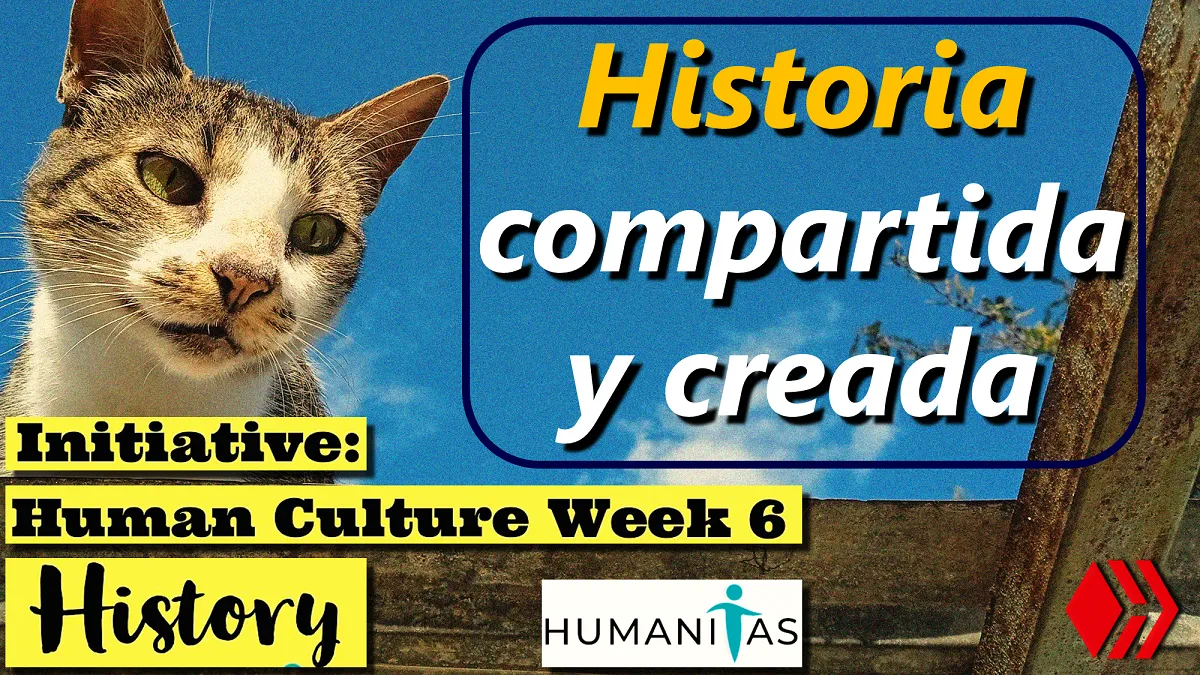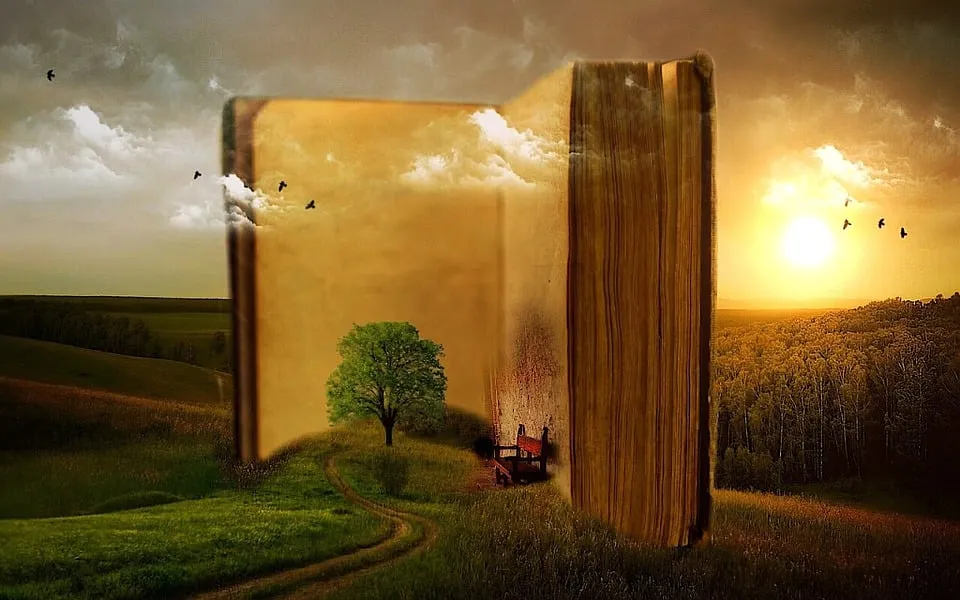¿La historia nos hace como humanos, o somos los humanos que hacemos la historia?
¿Qué se te viene a la mente con la palabra historia? Podrías inmediatamente pensar en aquella asignatura de la escuela que suele ser aburrida para algunos. Pero también podríamos hablar del historial clínico de una persona, el historial de transacciones de tu wallet de #Hive, o más cotidiano aún, tu última historia en las redes sociales tradicionales (WhatsApp, Instagram, Twitter, etc.), entre muchos otros ejemplos.
Todo esto nos habla de algo en común: los hechos que sucedieron en un determinado momento, algo que fue expresado o ejecutado, y fue visto por los demás. Solemos ver aquellos hechos de hace muchos años atrás como acontecimientos lejanos en la historia, pero lo que vives actualmente también es y será historia.
Este es el enlace de la iniciativa: Iniciativa: Cultura Humana Semana 6: Historia. En la comunidad Humanitas.

Todo lo anterior nos habla de que continuamente estamos haciendo historia. El ser humano traza su propio camino en el tiempo. Nuestras decisiones, dentro del pequeño margen de libre albedrío que tenemos, es lo que queda registrado. Pero nunca sabremos exactamente qué sentía o pensaba alguien al momento de compartir su historia al mundo. Somos nosotros quienes le damos cierta interpretación, la cual bien podría ser cercana a la verdadera realidad, o podrían ser suposiciones basadas en la poca evidencia que tenemos.
Yo diría, desde mi apreciación, que la historia nos hace como humanos pero también los humanos hacemos la historia. Sería algo similar a lo que piensa el compañero @filoriologo en su post. Ambas visiones se entrelazan o complementan.
La historia compartida y la historia creada
Podemos ver esto desde un punto de vista muy cotidiano. El ser humano es un ser altamente social, por lo que constantemente comparte información con otros seres humanos, ya sea consciente o inconscientemente. Puede que te encuentres en la playa y lo compartas en tus redes sociales. Haz mostrado tu historia al mundo, algo muy humano, al igual que cuando hace miles de años pintábamos escenas de caza de animales en cuevas. Pero los demás crean en sus mentes una historia en torno a ti, una historia sobre algo que ellos no hicieron, pero es lo que quedará en el imaginario de todos.
De igual manera, la historia que conoces sobre la humanidad es el resultado de la observación de otras personas casi seguramente ajenas a los hechos. Pero esto no quiere decir que dicha historia sea falsa, sino que siempre habrá margen para distintas interpretaciones, especialmente si la información es escasa.

La historia que el ser humano comparte es única e inalterable, pero la historia que crea es modificable. En la historia han ocurrido cosas que han sucedido tal cual y ya no se pueden modificar, pero a lo largo del tiempo, se han creado historias que puede que hayan sido influenciadas por sesgos del ser humano, buscando un objetivo distinto al de tratar de conocer la historia verdadera.
Un ejemplo de lo anterior podría ser el caso de la época colonial en América. Ya había escrito un post sobre este tema anteriormente en la comunidad Humanitas. Durante mucho tiempo, mi imagen mental de esta época era la que me habían enseñado en la escuela, y la que constantemente se dice en medios de comunicación. Pero al detenerte a leer y escuchar otras perspectivas, te das cuenta que la realidad es mucho más compleja y difícil de conocer, y muchas cosas buenas también pueden ocurrir y ocurrieron en épocas que parecían totalmente oscuras.
Poca información compartida. Civilizaciones antiguas
Mi momento favorito en la historia es posiblemente hace más de 10000 años, cuando de manera sorpresiva, el ser humano empieza a construir templos de piedra de manera impresionante, alrededor de 7000 años antes que las Pirámides de Egipto. Me llama mucho la atención el tema de las construcciones y civilizaciones antiguas. La poca información que se tiene en torno a cómo se construyeron muchas de las estructuras antiguas hace que toda clase de historias se creen en torno a ellas, pero la verdadera quizás nunca la conozcamos.

Muchos atribuyen estas impresionantes construcciones antiguas al ingenio humano, el cual existe y existió hace miles de años. Pero la falta de información hace que también surjan suposiciones en torno a "ayuda de alienígenas" o "tecnología avanzada" en una época imposible. ¿Cuál es la verdadera historia? El misterio y lo desconocido llaman mucho la atención. Me gusta la idea de que hace miles de años existieron civilizaciones con tecnología avanzada, pero en este caso estaríamos hablando de mitos. Quizás la verdadera historia no es tan fantástica, pero no dejaría de ser impresionante.
Creo que el ser humano empezó a hacer historia cuando empezó a compartir información a los demás, y empezó a desarrollarse la capacidad de registrar o interpretar esa información compartida de los demás. Sin este vínculo no habría historia.
Espero que hayas disfrutado de esta lectura. Invito a participar en esta iniciativa a @gracielaacevedo @rosahidalgo @besamu @sirenahippie
English version
Does history make us as humans, or do humans make history?
What comes to mind with the word history? You might immediately think of that school subject that is often boring for some people. But we could also talk about a person's clinical story, the transaction history of your #Hive wallet, or even more everyday, your latest story on traditional social networks (WhatsApp, Instagram, Twitter, etc.), among many other examples.
All this tells us about something in common: the facts that happened at a certain time, something that was expressed or executed, and was seen by others. We tend to see those events of many years ago as distant events in history, but what you are living today is and will be history as well.
This is the link to the initiative: Initiative: Human Culture Week 6: History. In the Humanitas community.
All of the above tells us that we are continually making history. Human beings trace their own path in time. Our decisions, within the small margin of free will we have, are what is recorded. But we will never know exactly what someone was feeling or thinking at the time they shared their story with the world. It is we who give it a certain interpretation, which could very well be close to the true reality, or it could be assumptions based on the little evidence we have.
I would say, from my point of view, that history makes us as humans but also humans make history. It would be something similar to what fellow @filoriologo thinks in his post. Both views intertwine or complement each other.
Shared history and created history
We can see this from a very everyday point of view. Human beings are highly social beings, so they constantly share information with other human beings, either consciously or unconsciously. You may find yourself on the beach and share it on your social networks. You have shown your story to the world, something very human, just like when thousands of years ago we painted scenes of hunting animals in caves. But others create in their minds a story around you, a story about something they didn't do, but that is what will remain in everyone's imagination.
In the same way, the story you know about humanity is the result of the observation of other people who are almost certainly not aware of the facts. But this does not mean that such a story is false, but that there will always be room for different interpretations, especially if the information is scarce.

The history that human beings share is unique and unalterable, but the history they create is modifiable. In history there have been things that have happened as they are and can no longer be modified, but over time, stories have been created that may have been influenced by human biases, seeking a different objective than trying to know the true history.
An example of the above could be the case of the colonial era in America. I had already written a post on this topic before in the Humanitas community. For a long time, my mental image of this era was the one I had been taught in school, and the one constantly told in the media. But when you stop to read and listen to other perspectives, you realize that reality is much more complex and difficult to know, and many good things can and did happen in times that seemed totally obscure.
Few shared information. Ancient civilizations
My favorite moment in history is possibly more than 10000 years ago, when surprisingly, humans start building stone temples in an impressive way, around 7000 years before the Pyramids of Egypt. I am very much struck by the topic of ancient constructions and civilizations. The little information we have about how many of the ancient structures were built means that all sorts of stories are created around them, but the real one we may never know.

Many attribute these impressive ancient constructions to human ingenuity, which exists and existed thousands of years ago. But the lack of information also raises assumptions about "alien help" or "advanced technology" in an impossible time. What is the real story? Mystery and the unknown are very appealing. I like the idea that thousands of years ago there were civilizations with advanced technology, but in this case we would be talking about myths. Maybe the real story is not so fantastic, but it would still be impressive.
I believe that human beings began to make history when they began to share information with others, and began to develop the ability to record or interpret that shared information from others. Without this link there would be no history.
I hope you enjoyed this reading. Leave your comment or opinion.
Translated to English language with the help of DeepL.com
Fotografía de portada de autoría propia.
Otras redes sociales:
 |
 |
 |
 |
F1 & motorsports: @acontmotor
 |
 |
 |
 |
| ¡Gracias por visitar! — ¡Thanks for visiting!  |
